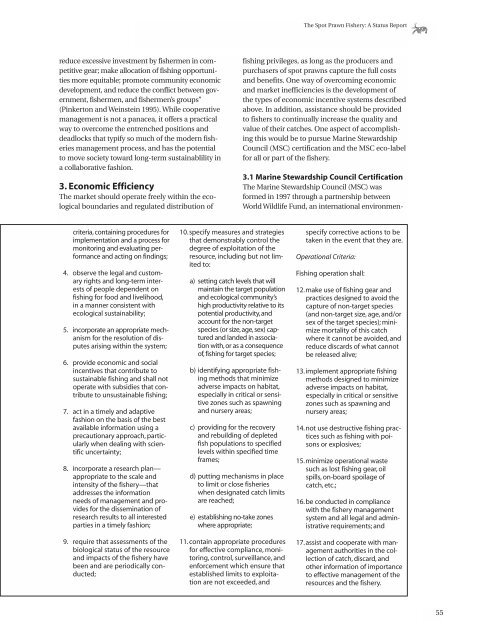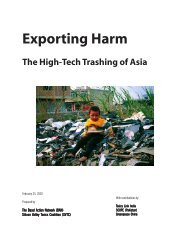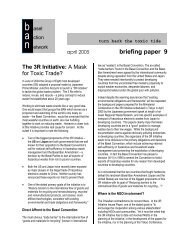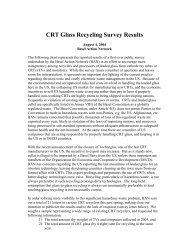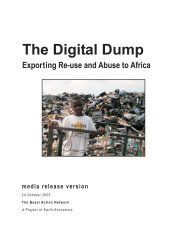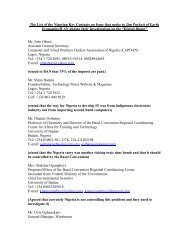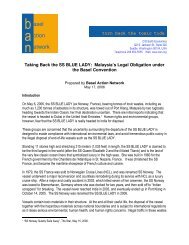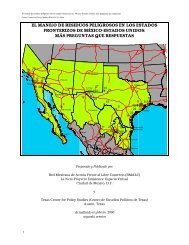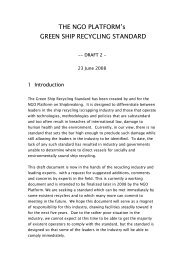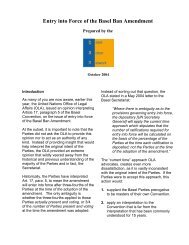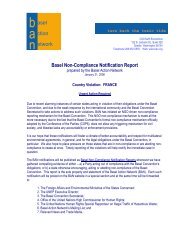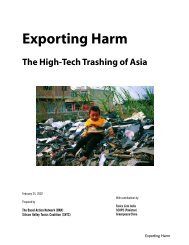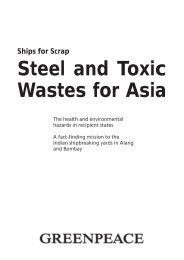The Spot Prawn Fishery The Spot Prawn Fishery - Basel Action ...
The Spot Prawn Fishery The Spot Prawn Fishery - Basel Action ...
The Spot Prawn Fishery The Spot Prawn Fishery - Basel Action ...
Create successful ePaper yourself
Turn your PDF publications into a flip-book with our unique Google optimized e-Paper software.
educe excessive investment by fishermen in competitive<br />
gear; make allocation of fishing opportunities<br />
more equitable; promote community economic<br />
development, and reduce the conflict between government,<br />
fishermen, and fishermen’s groups”<br />
(Pinkerton and Weinstein 1995). While cooperative<br />
management is not a panacea, it offers a practical<br />
way to overcome the entrenched positions and<br />
deadlocks that typify so much of the modern fisheries<br />
management process, and has the potential<br />
to move society toward long-term sustainablility in<br />
a collaborative fashion.<br />
3. Economic Efficiency<br />
<strong>The</strong> market should operate freely within the ecological<br />
boundaries and regulated distribution of<br />
criteria, containing procedures for<br />
implementation and a process for<br />
monitoring and evaluating performance<br />
and acting on findings;<br />
4. observe the legal and customary<br />
rights and long-term interests<br />
of people dependent on<br />
fishing for food and livelihood,<br />
in a manner consistent with<br />
ecological sustainability;<br />
5. incorporate an appropriate mechanism<br />
for the resolution of disputes<br />
arising within the system;<br />
6. provide economic and social<br />
incentives that contribute to<br />
sustainable fishing and shall not<br />
operate with subsidies that contribute<br />
to unsustainable fishing;<br />
7. act in a timely and adaptive<br />
fashion on the basis of the best<br />
available information using a<br />
precautionary approach, particularly<br />
when dealing with scientific<br />
uncertainty;<br />
8. incorporate a research plan—<br />
appropriate to the scale and<br />
intensity of the fishery—that<br />
addresses the information<br />
needs of management and provides<br />
for the dissemination of<br />
research results to all interested<br />
parties in a timely fashion;<br />
9. require that assessments of the<br />
biological status of the resource<br />
and impacts of the fishery have<br />
been and are periodically conducted;<br />
10.specify measures and strategies<br />
that demonstrably control the<br />
degree of exploitation of the<br />
resource, including but not limited<br />
to:<br />
a) setting catch levels that will<br />
maintain the target population<br />
and ecological community’s<br />
high productivity relative to its<br />
potential productivity, and<br />
account for the non-target<br />
species (or size, age, sex) captured<br />
and landed in association<br />
with, or as a consequence<br />
of, fishing for target species;<br />
b) identifying appropriate fishing<br />
methods that minimize<br />
adverse impacts on habitat,<br />
especially in critical or sensitive<br />
zones such as spawning<br />
and nursery areas;<br />
c) providing for the recovery<br />
and rebuilding of depleted<br />
fish populations to specified<br />
levels within specified time<br />
frames;<br />
d) putting mechanisms in place<br />
to limit or close fisheries<br />
when designated catch limits<br />
are reached;<br />
e) establishing no-take zones<br />
where appropriate;<br />
11. contain appropriate procedures<br />
for effective compliance, monitoring,<br />
control, surveillance, and<br />
enforcement which ensure that<br />
established limits to exploitation<br />
are not exceeded, and<br />
<strong>The</strong> <strong>Spot</strong> <strong>Prawn</strong> <strong>Fishery</strong>: A Status Report<br />
fishing privileges, as long as the producers and<br />
purchasers of spot prawns capture the full costs<br />
and benefits. One way of overcoming economic<br />
and market inefficiencies is the development of<br />
the types of economic incentive systems described<br />
above. In addition, assistance should be provided<br />
to fishers to continually increase the quality and<br />
value of their catches. One aspect of accomplishing<br />
this would be to pursue Marine Stewardship<br />
Council (MSC) certification and the MSC eco-label<br />
for all or part of the fishery.<br />
3.1 Marine Stewardship Council Certification<br />
<strong>The</strong> Marine Stewardship Council (MSC) was<br />
formed in 1997 through a partnership between<br />
World Wildlife Fund, an international environmen-<br />
specify corrective actions to be<br />
taken in the event that they are.<br />
Operational Criteria:<br />
Fishing operation shall:<br />
12. make use of fishing gear and<br />
practices designed to avoid the<br />
capture of non-target species<br />
(and non-target size, age, and/or<br />
sex of the target species); minimize<br />
mortality of this catch<br />
where it cannot be avoided, and<br />
reduce discards of what cannot<br />
be released alive;<br />
13. implement appropriate fishing<br />
methods designed to minimize<br />
adverse impacts on habitat,<br />
especially in critical or sensitive<br />
zones such as spawning and<br />
nursery areas;<br />
14. not use destructive fishing practices<br />
such as fishing with poisons<br />
or explosives;<br />
15. minimize operational waste<br />
such as lost fishing gear, oil<br />
spills, on-board spoilage of<br />
catch, etc.;<br />
16. be conducted in compliance<br />
with the fishery management<br />
system and all legal and administrative<br />
requirements; and<br />
17. assist and cooperate with management<br />
authorities in the collection<br />
of catch, discard, and<br />
other information of importance<br />
to effective management of the<br />
resources and the fishery.<br />
55


